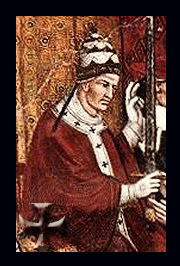Non Parum Animus Noster on:
[Wikipedia]
[Google]
[Amazon]
 ''Non parum animus noster'' was a
''Non parum animus noster'' was a
 ''Non parum animus noster'' was a
''Non parum animus noster'' was a papal
The pope ( la, papa, from el, πάππας, translit=pappas, 'father'), also known as supreme pontiff ( or ), Roman pontiff () or sovereign pontiff, is the bishop of Rome (or historically the patriarch of Rome), head of the worldwide Cathol ...
bull
A bull is an intact (i.e., not castrated) adult male of the species ''Bos taurus'' (cattle). More muscular and aggressive than the females of the same species (i.e., cows), bulls have long been an important symbol in many religions,
includin ...
issued by Pope Alexander III
Pope Alexander III (c. 1100/1105 – 30 August 1181), born Roland ( it, Rolando), was head of the Catholic Church and ruler of the Papal States from 7 September 1159 until his death in 1181.
A native of Siena, Alexander became pope after a con ...
on either 11 September 1171 or 1172 to promote the Northern Crusades
The Northern Crusades or Baltic Crusades were Christianity and colonialism, Christian colonization and Christianization campaigns undertaken by Catholic Church, Catholic Christian Military order (society), military orders and kingdoms, primarily ...
against the "pagan
Paganism (from classical Latin ''pāgānus'' "rural", "rustic", later "civilian") is a term first used in the fourth century by early Christians for people in the Roman Empire who practiced polytheism, or ethnic religions other than Judaism. ...
" Estonians
Estonians or Estonian people ( et, eestlased) are a Finnic ethnic group native to Estonia who speak the Estonian language.
The Estonian language is spoken as the first language by the vast majority of Estonians; it is closely related to other ...
and Finns
Finns or Finnish people ( fi, suomalaiset, ) are a Baltic Finnic ethnic group native to Finland.
Finns are traditionally divided into smaller regional groups that span several countries adjacent to Finland, both those who are native to these ...
.Eric Christiansen, ''The Northern Crusades'' (London: Penguin, 1997), p. 71. It was addressed to the rulers and peoples of Denmark
)
, song = ( en, "King Christian stood by the lofty mast")
, song_type = National and royal anthem
, image_map = EU-Denmark.svg
, map_caption =
, subdivision_type = Sovereign state
, subdivision_name = Danish Realm, Kingdom of Denmark
...
, Sweden
Sweden, formally the Kingdom of Sweden,The United Nations Group of Experts on Geographical Names states that the country's formal name is the Kingdom of SwedenUNGEGN World Geographical Names, Sweden./ref> is a Nordic country located on ...
and Norway
Norway, officially the Kingdom of Norway, is a Nordic country in Northern Europe, the mainland territory of which comprises the western and northernmost portion of the Scandinavian Peninsula. The remote Arctic island of Jan Mayen and t ...
and begins with a description of the threat posed by the Estonians
Estonians or Estonian people ( et, eestlased) are a Finnic ethnic group native to Estonia who speak the Estonian language.
The Estonian language is spoken as the first language by the vast majority of Estonians; it is closely related to other ...
.Iben Fonnesberg-Schmidt, ''The Popes and the Baltic Crusades: 1147-1254'' (Brill, 2007), p. 59. Alexander declared:
''We are deeply distressed and greatly worried when we hear that the savage Estonians and other pagans in those parts rise and fight God's faithful and those who labour for the Christian faith and fight the virtue of the Christian name. ... to gird yourselves, armed with celestial weapons and the strength of Apostolic exhortations, to defend the truth of the Christian faith bravely and to expand the Christian faith forcefully.''Alexander further promised an indulgence and one year's remission of sin to those who fought the pagans. Those who died in this crusade would receive full indulgence:
''Trusting God's mercy and merits of the apostles Peter and Paul, we thus concede to those forcefully and magnanimously fighting these often mentioned pagans one year's remission of sins for which they have made confession and received a penance as we are accustomed to grant those who go to the Lord's Sepulchre. To those who die in this fight we grant remission of all their sins, if they have received a penance.''The sole copy of the bull to survive is in
Peter Cellensis
Peter Cellensis, also known as Peter of Celle, Peter of Celles, Pierre de Celle and Peter de la Celle, (c. 1115 in Troyes – 20 February 1183, at Chartres) was a French Benedictine and bishop.
Life
He was born into an aristocratic family of Cham ...
's letter-book.Fonnesberg-Schmidt, p. 55, n. 117.
Notes
{{reflist 12th-century papal bulls Documents of Pope Alexander III Northern Crusades